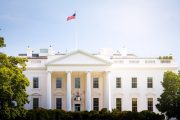
This week, this writer received a fundraising letter from the Convention of States (COS) organization, signed by its president, Mark Meckler — a letter filled with weak arguments and amazing contradictions.
The letter begins by lamenting the frustration of electing new members to Congress who promise “big changes,” but after a “charade of meaningless activity,” there winds up being “no tangible results.” The solution they offer is a so-called Convention of States (a term that appears nowhere in the U.S. Constitution) using Article V of the Constitution.
Now, it is true that Article V of the Constitution provides for ways to propose amendments to the Constitution, and two ways for the states to ratify those proposals. The Congress determines which ratification method the state governments use, and 26 of 27 times they have used the method that requires three-fourths of the state legislatures to ratify, while the other method — ratification by three-fourths of state conventions — has been used only once.
What COS wants to do is to use the method of proposing changes to the Constitution that has never been used in our nation’s history — a Constitutional Convention, requested by a petition of two-thirds of the states and then called by Congress. All 27 amendments have been proposed by Congress by a two-thirds vote of each house of Congress.
Interestingly, after stating, fairly accurately, that “new members of Congress” promise big changes, but once in office participate in a “charade of meaningless activity” with “no tangible results,” the COS letter calls for the Constitutional Convention to propose term limits on members of Congress!
The most charitable thing that I can say about this is that Meckler fails to see illogic in this, arguing for an amendment to the Constitution to place term limits on present members of Congress as a solution to our problems. This, right after he has said that we elect new members of Congress and there are no tangible results.
Obviously, term limits, by Meckler’s own reasoning, are not the solution.
What else is this Convention going to do? Meckler says it would “sidestep” Congress, and “propose amendments to the Constitution that will limit the power of the federal government and protect our liberties.” The problem with this argument is that we already have an excellent Constitution that places limits on the power of the federal government and protects our liberties, and yet, few members of Congress take their oaths to follow it very seriously. Most of the bills that Congress passes now are unconstitutional, but that doesn’t stop them from passing them. The First Amendment prohibited Congress from infringing on freedom of speech or of the press, yet only seven years after it was ratified Congress did just that with the Sedition Act. And that was at a time when our leaders had a greater understanding of and fidelity to the Constitution than what they have today.
Meckler asserts that this modern Convention would (not just might) pass a federal balanced budget amendment, or BBA. But our unbalanced federal budgets and ensuing crippling national debt is a result of unconstitutional federal spending. If members of Congress simply quit spending money on just half of the things they spend money on that are beyond what the Constitution authorizes them to spend money on, the budget would be balanced.
The COS letter assures the reader that a “runaway convention” is not possible, because three-fourths of the states would have to ratify any amendments adopted at the convention. This raises a few more questions. First, the fear of a “runaway convention” — one in which amendments that increase federal power, not decrease it, are proposed — is a well-founded fear. We will not have James Madison, George Washington, and Alexander Hamilton at a convention envisioned by COS. Left-wing radicals, desirous of abolishing the Electoral College and gutting the Second Amendment — and even delegates wishing to completely abolish our present Constitution — will also be present.
Late Supreme Court Justice Antonin Scalia warned that this a bad century in which to write a Constitution. James Madison, known as the Father of the Constitution, feared what might come out of a second convention.
And, should it give us any assurance that the state legislatures would refuse to ratify an amendment abolishing the Electoral College or one erasing the Second Amendment from the Constitution? Lobbyists would descend upon the state legislatures like locusts, pushing for ratification of amendments desired by those on the Left. Legislatures such as those in California would certainly ratify the abolition of the Electoral College and the Second Amendment. No doubt many other states would, as well.
Are you prepared to count on enough legislators in the states to stand up for our present Constitution to keep this from happening?
Meckler claims that a national convention is our “only solution.” But even if such a convention met and adopted some good amendments, would it really matter? After all, if members of Congress are not going to follow our present Constitution, why would anyone seriously think they will follow some additional words? They only followed the First Amendment for seven years before ignoring it with the Sedition Act.
Some think “term limits” and “balanced budget amendments” are the solution, but really, there are no easy answers. We could expect districts such as that in San Francisco that elect Nancy Pelosi to Congress to replace her with someone just like her if we had term limits. If Congress has to follow a balanced budget amendment, they will simply raise taxes to balance it — if they even bother to follow the Constitution at all.
Before we can expect better members of Congress, we have to have voters, educated in limited government and free enterprise, who will elect better members of Congress. State officials can refuse to cooperate with federal officials attempting to impose unconstitutional laws in their states. We can challenge our members of Congress to follow the Constitution. Instead of expending our time and energy trying to get term limits, we should use that time and energy to get better people — people who really believe in liberty and limited government — elected to Congress.
Calling a national convention in our present political atmosphere is like playing Russian Roulette with our Constitution.





